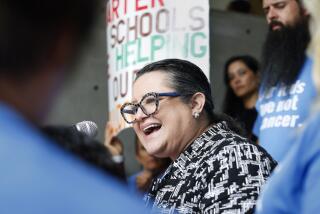Not-so-public education
- Share via
Supporters of school vouchers like to say that their goal is to provide a higher-quality education for the children who need it most. The latest events in Colorado say otherwise. A voucher program there seems more likely to benefit middle-class children and religious schools than low-income public school students, and to worsen inequities in education.
Last week, the board of the Douglas County School District voted for a pilot program that will give the parents of 500 of its 60,000-students about $4,500 each — 75% of what the district receives in per-pupil funding — to use toward tuition at participating private schools of their choice. Many of the private schools in the area are religiously based.
Even in Colorado, where a dollar stretches a lot further than in Southern California, $4,500 falls significantly short of private school tuition. Most schools there range from about $7,000 up to $14,000. Clearly, the parents poised to benefit most from this taxpayer-sponsored perk are those with a few thousand to spare to fill in the price gap. There might be scholarships for some of the needier students — about 10% of the Douglas County students qualify for free or reduced-price school lunches — but no one is promising anything.
The private schools will be allowed to operate pretty much as they see fit. If that means accepting only the highest achievers, or rejecting students whose parents are gay or who are from a different religious background, no problem.
As long as the schools are accredited, there are no restrictions on their curriculum or instruction. They can teach creationism in place of real science, or promote their own religious beliefs exclusively, with substantial taxpayer funding.
The voucher movement has been overshadowed in recent years by the move toward charter schools and other reforms. But charter schools must either accept students by lottery or give preference to those within their attendance boundaries. They cannot reject students on the basis of religion, achievement or wealth, nor can they promote particular religious beliefs. Under the guise of making public schools more accountable, Douglas County is setting a dangerous new precedent for bringing back vouchers, which have produced mixed results in various studies.
Americans have long supported a free and public education for all; the concept is embedded into each state’s constitution. Public schooling is, at least in theory, the great equalizer and meritocracy, in which hardworking, committed students have an equal chance to gain the knowledge and skills necessary to accomplish great things. Using public money to support a fragmented private school model with vastly unequal offerings is not the way to build a stronger educational system.
More to Read
A cure for the common opinion
Get thought-provoking perspectives with our weekly newsletter.
You may occasionally receive promotional content from the Los Angeles Times.






